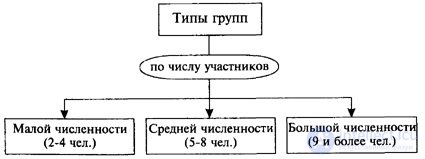Lecture
In order to improve the effectiveness of social prevention, it is important to know not only the general condition and the main features of juvenile delinquency, the identity of the juvenile delinquent, but also the psychology of criminal groups and their characteristics. These groups differ in their size, age composition and sex, duration of existence, degree of organization, cohesion and independence, degree and types of criminal activity and criminal mobility. Consider these groups by the named parameters.
1. Types of criminal groups of minors by the number of their participants
Criminal groups of minors are different in the number of their participants (see diagram 3.1).
Scheme 3.1 
It is possible to allocate conditionally: small, medium and large numbers of criminal groups.
The size of a group is an important indicator affecting its cohesion, criminal activity and criminal mobility. As a rule, the greater the number of group members, the less its cohesion, but the higher its criminal activity and criminal mobility. In this case, a small group, most often involved in the crime with its full complement, large and medium groups often commit crimes in subgroups.
Any of these groups can act independently, constitute a "branch" of a larger criminal group or mafia structure, acting according to a common plan. In small groups, an important group-forming factor is friendly feelings, mutual emotional stress. Having often emerged as a friendly, such a group under the influence of a number of objective unfavorable factors (the presence of a leader with criminal experience, the influence of the nearest criminal environment of adults, school and family distress, etc.) develops into a criminal one. There are criminal groups of the so-called variable composition (in some crimes one part of the group participates, in others - the other, etc.).
Comments
To leave a comment
Criminal psychology
Terms: Criminal psychology